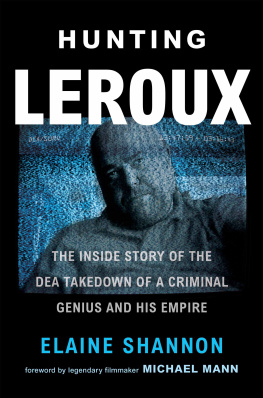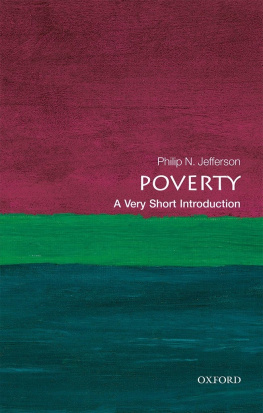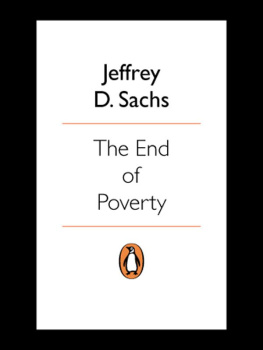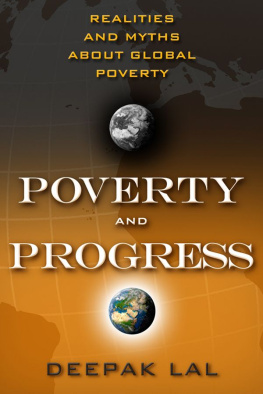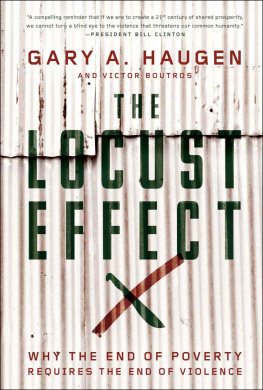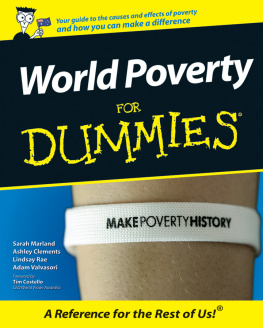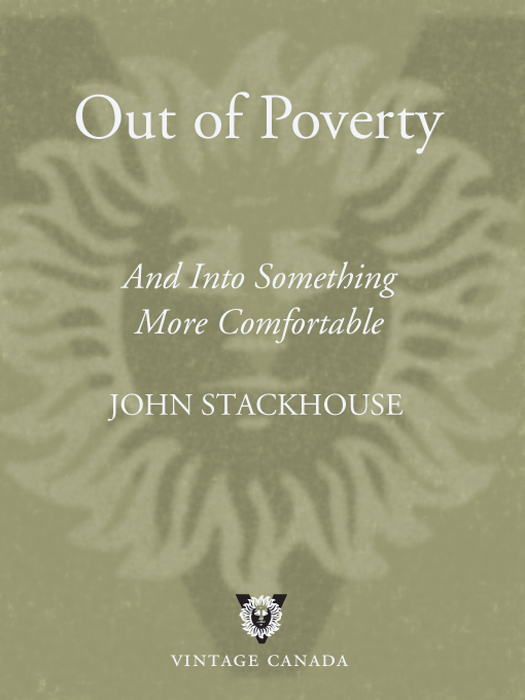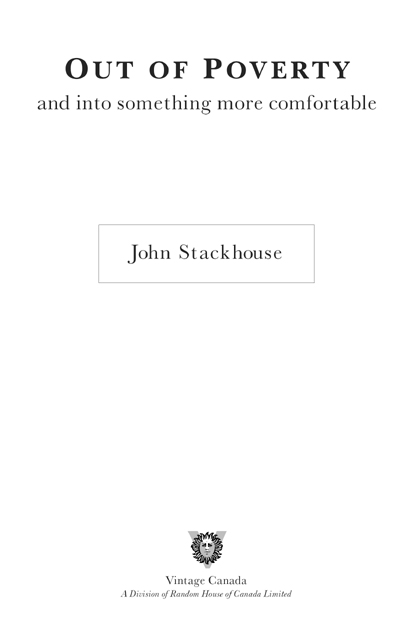VINTAGE CANADA EDITION 2001
Copyright 2000 by John Stackhouse
All rights reserved under International and Pan-American Copyright Conventions. Published in 2001 by Vintage Canada, a division of Random House of Canada Limited. Originally published in hardcover in 2000 by Random House Canada. Distributed by Random House of Canada Limited.
Vintage Canada and colophon are trademarks
of Random House of Canada Limited.
Canadian Cataloguing in Publication Data
Stackhouse, John
Out of poverty : and into something more comfortable
eISBN: 978-0-307-36389-3
1. Stackhouse, John, 1962 Journeys Developing Countries. 2. Poor Developing countries. 3. Developing countries Economic conditions. I. Title.
HC59.72.P6S72 2001 362.5 09172 4 C00-932468-2
Inside photos: Cindy Andrew and John Stackhouse ()
www.randomhouse.ca
v3.1
C ONTENTS
I NTRODUCTION
When I left Canada in the fall of 1991 to become The Globe and Mails first overseas development writer, I had no idea what I was getting into. Of course, I had been exposed to charities and missionaries and knew what they did in lands far away. After graduating from university, I had wanted to teach in Africa. But I was trained in macroeconomics and Macbeth, not chemistry or computers, and was turned down by most of the organizations I approached. I travelled, instead, largely in Asia, writing about development as I went. With my wife, Cindy Andrew, a photographer, I met slum children in Bombay, aboriginal women in the Indian interior and scattered hill tribes in northern Thailand. And, for a brief time, I believed that improving their circumstances was a straightforward matter.
Perhaps it was my middle-class upbringing in Toronto, as the son of children of the Great Depression, but during my early travels I equated development with material progress. I was hardly alone in such thinking. By the 1980s, development organizations believed they had a pretty clear idea of how wealth was generated, as if the centuries-old struggle to end poverty and deprivation was a problem that could finally be solved just as science had unravelled the mysteries of nuclear fission. Establishing a fair and open economy and a reasonable standard of civil liberties were important. Add to that the right public investmentsin education, health care, affordable housing and accessible creditand any human life anywhere could be transformed. If the tribal women we met hauling rocks for fifty cents a day were given half a chance, I was convinced they could change their lives, their villages and their countries for the better.
At the start of the 1990s, this simple formulademocracy plus free markets equals progresswas treated as the new universal truth. The massive, interventionist, government development schemes of the sixties and seventies had been swept away by the tide of Reaganomics and Thatcherism. The Cold War against Communism was over, the Soviet Union and its satellite nations were bankrupt, while the statist beliefs that towered over much of the developing world since the fifties were discredited. If governments restricted their economic role to regulation and guidance and invested judiciously in building an attractively educated workforce, it was believed, poverty could be wiped out in a generation.
In November 1991, as I boarded a flight to Hong Kong and then Bangkok to begin a new journey as a foreign correspondent, I thought of the tribal rock haulers and how their lives could be changed if only their country and their community followed this kind of advice. It was all laid out in a pile of briefing papers I had received from the World Bank and the International Monetary Fundthe two Washington-based organizations that finance most of the worlds poorest governments. They were about to hold their joint annual meetings in Bangkok, and they wanted the world, especially the developing world, to know that there was a clear path ahead. For proof, delegates had to look no further than the Thai capital, where my flight landed eighteen hours later in a thick aerial swamp of humidity. Bangkok was material evidence of the most astonishing creation of wealth since post-war Japan. Cindy and I had explored the city five years earlier, wandering along its fetid canals and through its ragged shantytowns; now it was dressed to the nines in commerce and trade. Glass bank towers and high-rise hotels had grown from the noodle stalls we had frequented. A new expressway ran over the old shantytowns, and many more like it were planned. Thailand, which had the worlds fastest-growing economy through the eighties, had become the worlds second largest market for Mercedes-Benz (after Germany) and the biggest consumer of Johnnie Walker Scotch whisky. As a measure of progress, opulence was definitely in.
From the airport, I headed into the city centre, along roads free from traffic, thanks to a national holiday to welcome the World Bank and the IMF . Bangkok was playing host to every leading development figure, finance minister and international banker in the worldthe Olympics of development, some were calling it. This was a defining moment for an era. Mikhail Gorbachevs financial advisers had come from Moscow to try one more time to stave off the inevitable collapse and financial implosion of the Soviet Union. The Soviet team, humiliated enough to beg in front of the world, stood in sharp contrast to their Thai hosts, who had built a sumptuous conference centre, with its own lake and park in the city centre, just for the meetings. Across the road next to the conference centre, the government erected billboards to block the delegates view of an unsightly slum, and every evening, the Thais served us champagne and shrimp studded on ice sculptures.
Thailand was displaying its star development status, setting an example of how other impoverished countries could move out of poverty. A crucial ally of the United States, it provided air bases during the Vietnam War and a constant bulwark against Indochinas Communism. For that, it received huge amounts of foreign aid. But Thailand was also smart enough to invest heavily in primary education, land reforms and economic infrastructure, and to buy in to the IMF and World Bank free-market dreams.
None of the delegates seemed to care that the star student was a military regime that had ousted an elected government only ten months earlier. No one seemed to care that the wealth all around us was the creation of a select few Thais. Most of the planet was too busy realigning itself with the West. From Beijing to Bolivia, the triumph of capitalism seemed absolute and complete, the pursuit of wealth never more entrenched as a universal goal. To the believers, an end to the long, noble project of development was in sight, just two hundred years after the great Scottish economist Adam Smith wrote, Little else is requisite to carry a state to the highest degrees of opulence from the lowest barbarism, but peace, easy taxes and tolerant administration of justice.

The following May, after Cindy and I had settled in New Delhi, where we would live for the next seven years, I started to see the folly in Adam Smiths assumptions and my own. As I travelled from country to country, village to village, it became glaringly clear that human development is not about creating wealth, though income and material assets are important. It is not about outside interventions, whether they are massive government projects or simply the imposition of free-market ideologies. I came to see development as a process, even a struggle, that was internal to a place and deeply democratic in nature. This book is about those struggles, quiet as they are, carried out in hamlets and slums, on riverbanks and mountainsides, by people who until now have been largely excluded from public decision-making. These are villagers arguing with each other about where to put a school rather than merely accepting a World Bank recommendation. These are men running their own forests for profit, and girls sitting down to talk about their fathers and about how to break traditional bonds. In May 1992, these were also thousands of Thaisprofessionals, office workers, studentsblocking off central Bangkok, the very capital of new opulence, to demand a public voice.





